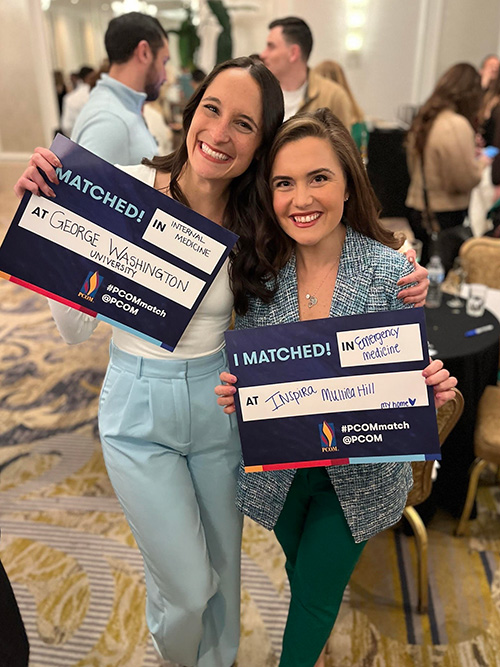Reflecting on Match Day
Student Perspective
March 28, 2023Medical school is rich with tradition and ritual. Milestones mark the way in an often
grueling journey to becoming a physician. The level of commitment required over a
student's time in school can sometimes be intense, but there are moments along the
way, like the annual right of passage known as Match Day, that signify you are one step closer to becoming a doctor.
Match Day is an annual tradition coordinated by the National Resident Matching Program,
a private, non-profit organization that matches medical students with residency programs
across the country for continued training after graduation. Students apply for residency
positions in their specialty of choice and are invited to interview with the residency
program directors. Students then rank each program by preference with the programs
likewise ranking the students they interview.
Doctor of Osteopathic Medicine (DO) students Katie O'Shea (DO '23), class chair, and Jordan Selep (DO '23) recently shared
reflections on the Match Day experience.
Local or long distance?
The choice between selecting a residency program close to home or something more long-distance
can be a challenging one. For O'Shea, it came down to having a support network:
“I wanted to make sure I was doing [my residency] in an environment where I felt supported
and where I could reach my full potential. PCOM really opened my eyes to being part
of a medical school community, and that applies to a residency as well. My advice
to other students is to ask yourself: Where do you feel supported so that you can
reach your full potential? Those were two of the biggest factors for me.”
Interview the interviewers
O'Shea and Selep both stressed the importance of approaching residency program interviews
the way one might in a more typical job interview – ask questions, visualize yourself
in the work environment and decide if the culture and the people are a good fit for
you.
“The interviews are a really important opportunity to get to know the residents and
ask difficult questions,” said O'Shea. “I went on one audition and one of the attending
physicians pulled me aside and said ‘Don't come here, these residents are overworked.
These residents are exhausted.’ It takes away from your experience because you're
fighting the mental health game.”
O'Shea added that her experience reinforced the reality that each student's path is
different and that one is no better than any other. “To figure out what you want and
figure out your reason ‘why?’ is really hard in medicine. Jordan's path is so different
because she's potentially going into fellowship. I am not looking toward fellowship
right now, so my priorities are a little different.”
One step in a journey
For those students who don't match or choose not to enter the match process, the pressure
can be magnified. Add in external pressures on social media, and it can all feel overwhelming.
“With social media comes the glorification of the match,” said O'Shea. “When DOs and
MDs used to match separately, it wasn't one day that everybody found out at the same
exact time. Even though it is a really cool and a special moment, [the match] being
glorified on social media makes it that much more stressful.”
Selep emphasized the value of putting things in perspective, reminding other students
that Match Day is only one day in a four-year journey through medical school. “I always
say in life or with anything, the journey is just as important as the result. And
I think it's so easy to forget that, especially when you know everything you have
worked so hard for is built up to this one day.”
“You almost forget about the four years that you just went through and what you did
to get there,” she added. “So remembering that, especially right now, has definitely
given me peace.”
About Philadelphia College of Osteopathic Medicine
Established in 1899, Philadelphia College of Osteopathic Medicine (PCOM) has trained
thousands of highly competent, caring physicians, health practitioners and behavioral
scientists who practice a “whole person” approach to care—treating people, not just
symptoms. PCOM, a private, not-for-profit accredited institution of higher education,
operates three campuses (PCOM, PCOM Georgia and PCOM South Georgia) and offers doctoral degrees in clinical psychology, educational psychology, osteopathic
medicine, pharmacy, physical therapy, and school psychology. The college also offers
graduate degrees in applied behavior analysis, applied positive psychology, biomedical
sciences, forensic medicine, medical laboratory science, mental health counseling,
physician assistant studies, and school psychology. PCOM students learn the importance
of health promotion, research, education and service to the community. Through its
community-based Healthcare Centers, PCOM provides care to medically underserved populations.
For more information, visit pcom.edu or call 215-871-6100.
Contact Us
For general media inquiries, please contact the Office of Marketing and Communications
at 215-871-6300 or communications@pcom.edu. Visit our media relations page to view contact information for public relations personnel.
Connect with PCOM

 Medical school is rich with tradition and ritual. Milestones mark the way in an often
grueling journey to becoming a physician. The level of commitment required over a
student's time in school can sometimes be intense, but there are moments along the
way, like the annual right of passage known as
Medical school is rich with tradition and ritual. Milestones mark the way in an often
grueling journey to becoming a physician. The level of commitment required over a
student's time in school can sometimes be intense, but there are moments along the
way, like the annual right of passage known as 